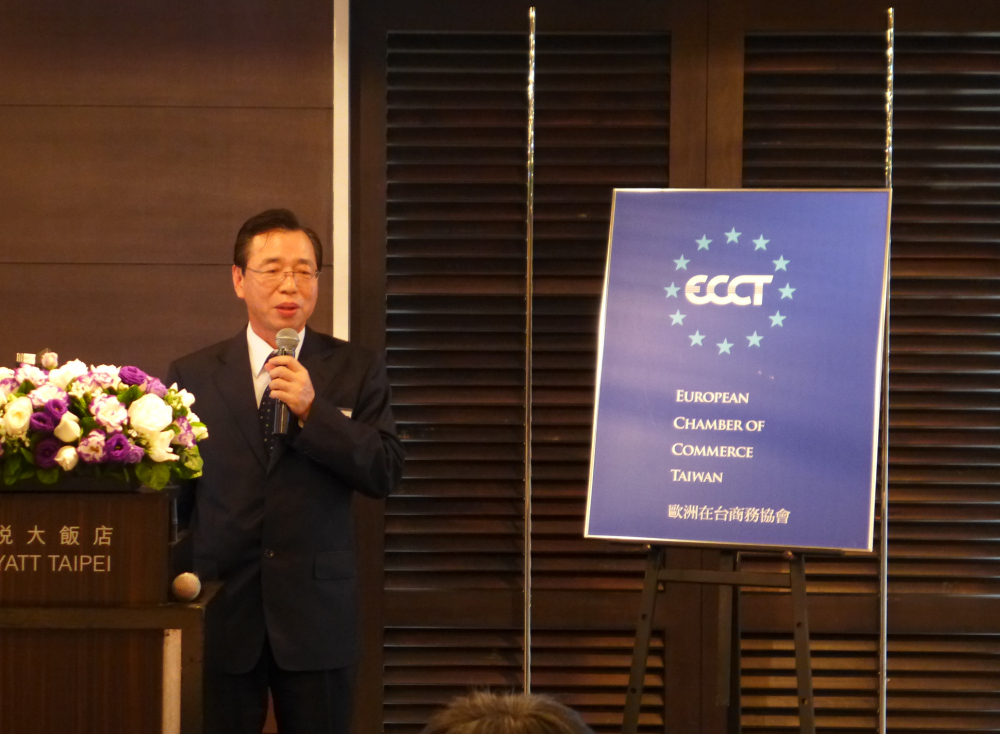Lunch with TWSE Chairman Lee Sush-der

According to Lee, there are 2.95 million investors actively trading on the TWSE and 1.48 million on the Gretai exchange. This includes 121 headquarters and 993 branches of securities firms.
Taiwan has a lot of listed companies relative to its size. There are currently 1,496 companies listed (838 on the main board, 658 on the Gretai and 261 emerging stocks) with a total market capitalization of approximately NT$27.5 trillion.
In 2013 the total trading volume reached NT$75.89 trillion, translating into an average daily trading value of NT$308.5 billion on 3.31 million orders and approximately 700,000 trades (daily). In 2013 TWSE-listed companies employed 1,115,364 people, accounting for 10.2% of Taiwan's total workforce, generated NT$29.21 trillion in revenues and paid out NT$831.64 billion in cash and stock dividends.
Taiwan is an excellent place to raise capital for all kinds of start-ups, medium and large companies. For new companies a new fund-raising platform was started in August last year, the "Go-funding Zone". Then, starting on 1 January this year, the "Go incubation board" went into operation. So far two firms have officially registered and more firms are applying. There are currently 261 "emerging market" companies with a total market cap of NT$640 billion. Of the 658 firms listed on the Gretai board, 20 are foreign firms while 36 of the 838 firms listed on the main board are foreign. In addition, 28 Taiwan Depository Receipts (TDRs), 21 Exchange Traded Funds (ETFs) and over 8,000 warrants are traded.
Taiwan remains a technology-focused market. 48% of firms listed on the TWSE are engaged in the technology sector (including semiconductors, optoelectronic, information service, computer and peripheral equipment, communications and internet, electronic parts/components and electronic product distribution among others) while about 14% are finance and insurance-related and another 14% are engaged in "basic industry" (such as plastic, oil, steel and chemicals).
The TWSE has evolved along with Taiwan's spectacular economic rise over the past 50 years. Securities were first traded in 1960 on an over-the-counter market. The 1970s saw the rise of capital markets, industrial development and the start of the high-tech industry. The 1980s brought the adoption of computerized trading and, in tandem with global trends, central depository and clearing systems and the establishment of brokerages. The 1990s ushered in an era of greater liberalization as brokerages were permitted to engage in margin trading and eligible foreign institutional investors were allowed to invest directly in Taiwan securities.
Since 2000, there has been a large increase in international investment and active endorsement of both domestic and foreign listings.
Trading in Taiwan has a relatively high proportion of retail investors as opposed to institutional investors but foreign participation has been steadily increasing over the past 13 years. In 2000 domestic individuals accounted for 86% of trading, domestic institutions 10% and foreign institutions about 4%. By 2013 (based on full year figures), the trading proportion of retail investors had fallen to 59% while domestic institutions accounted for 16% and the trading value of foreign institutions had risen more than six-fold to 24.6% of the total. Foreign investors held 34.6% of listed stocks (by market value) at the end of 2013.
Lee lauded Taiwan's fast, cost-effective review process and effective supervision. Review time is usually 2.5-3 months. The initial listing review fee is NT$500,000 and the annual listing fee ranges from NT$100,000-450,000.
Reflecting the change in market dynamics, the percentage of electronics sector issuers to total domestic issuers has decreased in recent years in favour of biotechnology, medical care, tourism and companies exposed to consumer demand in China. Of the 22 IPOs in 2013, only nine were from the electronics industry.
The TWSE has a number of market protection and monitoring mechanisms. These are clearly working given the remarkable decline in default cases and amounts in recent years. There was a 43% decline in default numbers in 2013 compared to 2011 and a similar decline in the number of securities firm defects over the same period.
Looking ahead, Lee outlined several planned developments. With regards to developing the renminbi market, Taiwan is building a trading platform for foreign currency-denominated products and RMB ETFs may be the first listed foreign currency-denominated product to be launched. The TWSE is also keen to launch innovative instruments to enhance product diversity and stem capital outflow including ETFs, a "Low Volatility High Dividend index" with the S&P and extendable callable bull/bear contracts and other new types of warrants. The TWSE is also working on ways to relax restrictions and boost liquidity. For example, 200 securities have been available for day trading since January this year. To keep up to date with technological developments, the TWSE has invested in sophisticated IT systems and is working on cloud computing.
